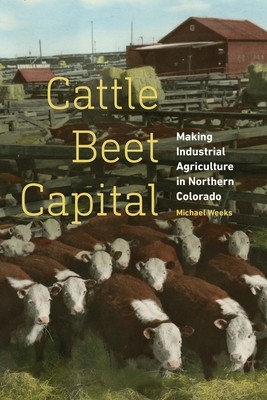
- We will send in 10–14 business days.
- Author: Michael Weeks
- Publisher: University of Nebraska Press
- Year: 2022
- Pages: 348
- ISBN-10: 1496208412
- ISBN-13: 9781496208415
- Format: 15.2 x 22.9 x 2.4 cm, kieti viršeliai
- Language: English
- SAVE -10% with code: EXTRA
Reviews
Description
In 1870 several hundred settlers arrived at a patch of land at the confluence of the South Platte and Cache la Poudre Rivers in Colorado Territory. Their planned agricultural community, which they named Greeley, was centered around small landholdings, shared irrigation, and a variety of market crops. One hundred years later, Greeley was the home of the world's largest concentrated cattle-feeding operation, with the resources of an entire region directed toward manufacturing beef. How did that transformation happen? Cattle Beet Capital is animated by that question.
Expanding outward from Greeley to all of northern Colorado, Cattle Beet Capital shows how the beet sugar industry came to dominate the region in the early twentieth century through a reciprocal relationship with its growers that supported a healthy and sustainable agriculture while simultaneously exploiting tens of thousands of migrant laborers. Michael Weeks shows how the state provided much of the scaffolding for the industry in the form of tariffs and research that synchronized with the agendas of industry and large farmers. The transformations that led to commercial feedlots began during the 1930s as farmers replaced crop rotations and seasonal livestock operations with densely packed cattle pens, mono-cropped corn, and the products pouring out of agro-industrial labs and factories. Using the lens of the northern Colorado region, Cattle Beet Capital illuminates the historical processes that made our modern food systems.EXTRA 10 % discount with code: EXTRA
The promotion ends in 23d.04:17:20
The discount code is valid when purchasing from 10 €. Discounts do not stack.
- Author: Michael Weeks
- Publisher: University of Nebraska Press
- Year: 2022
- Pages: 348
- ISBN-10: 1496208412
- ISBN-13: 9781496208415
- Format: 15.2 x 22.9 x 2.4 cm, kieti viršeliai
- Language: English English
In 1870 several hundred settlers arrived at a patch of land at the confluence of the South Platte and Cache la Poudre Rivers in Colorado Territory. Their planned agricultural community, which they named Greeley, was centered around small landholdings, shared irrigation, and a variety of market crops. One hundred years later, Greeley was the home of the world's largest concentrated cattle-feeding operation, with the resources of an entire region directed toward manufacturing beef. How did that transformation happen? Cattle Beet Capital is animated by that question.
Expanding outward from Greeley to all of northern Colorado, Cattle Beet Capital shows how the beet sugar industry came to dominate the region in the early twentieth century through a reciprocal relationship with its growers that supported a healthy and sustainable agriculture while simultaneously exploiting tens of thousands of migrant laborers. Michael Weeks shows how the state provided much of the scaffolding for the industry in the form of tariffs and research that synchronized with the agendas of industry and large farmers. The transformations that led to commercial feedlots began during the 1930s as farmers replaced crop rotations and seasonal livestock operations with densely packed cattle pens, mono-cropped corn, and the products pouring out of agro-industrial labs and factories. Using the lens of the northern Colorado region, Cattle Beet Capital illuminates the historical processes that made our modern food systems.

Reviews